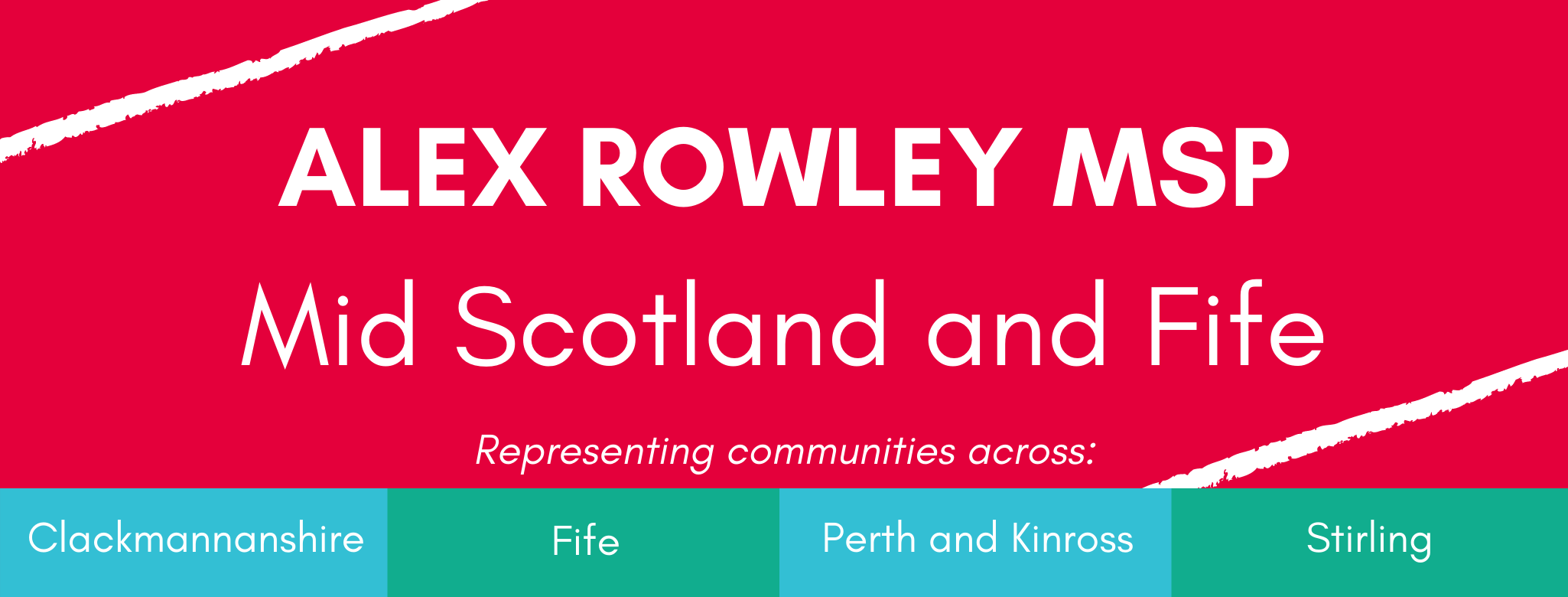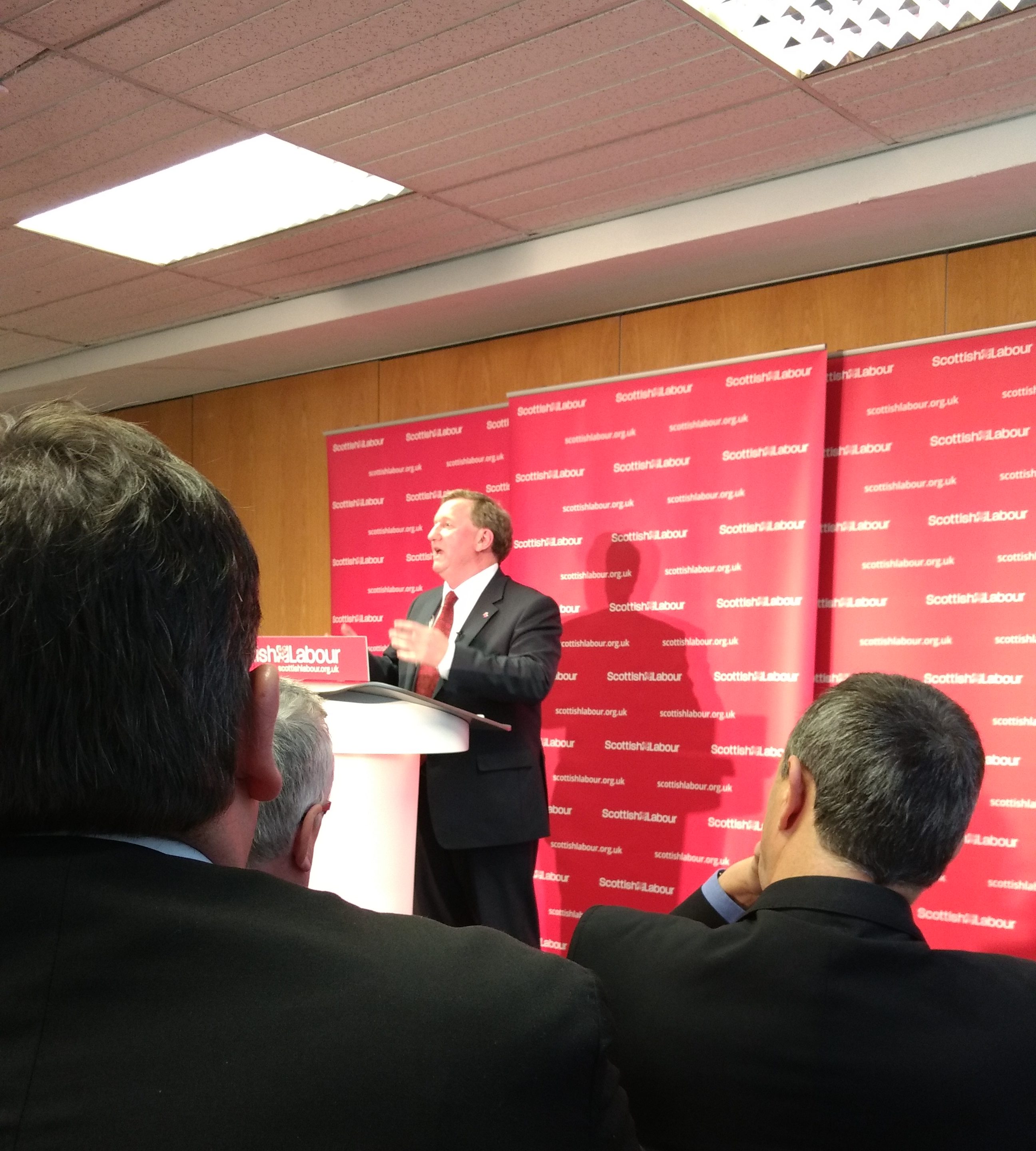Please see below a copy of the speech delivered by Alex Rowley MSP at the launch of the Scottish Labour Local Government Manifesto
“I would like to welcome everyone here today and wish you all the very best for 2017. In just 4 months’ time we will be asking people across Scotland to go to the polls and vote for their local councillors.
Today we are publishing our vision for local government in Scotland. Strong local councils accountable to local people putting those people and communities at the heart of everything they do.
This document is not a list of commitments of what Labour councils will do. That is something that local Labour parties in each local authority area will set out in their own local manifestoes in the coming weeks.
But by publishing a national vision of local government, we want to use these next few months in the lead up to the local council elections to encourage a discussion across Scotland about public services.
What kind of public services do we want to have in our local communities?
What should be the role of local councils in planning, paying for and providing local services?
How effective are those services at the moment in meeting the growing needs and demands of 21st Century Scotland?
What is the strategic role of local councils in setting priorities and driving the local and regional economies of Scotland?
This I would suggest is a discussion that is long overdue.
The fact is that Scotland is one of the most centralised countries in the western world, and the creation of the Scottish Parliament in 1999 did not lead to a continuing devolution of power closer to the people.
Instead we have seen politicians in Holyrood trying to control more and more of the power and decision making away from the local level.
This centralist approach has led to much weaker relationships between local and central government in Scotland, and all too often a lower quality of service being delivered as a result.
It has also resulted in the failure to bring together the key people and organisations needed to plan and drive our economy at the local, regional and national level.
One size fits all central control is not best for Scotland.
We want to build a new approach of government of equals, accountable to and driven by local communities with a wider partnership that recognises the role of the Third Sector, business and industry, Trade Unions, civic society and local communities in facing up to the big challenges of 21st century Scotland.
For example, the levels of poverty, of homelessness and the lack of opportunity for growing numbers of young people in our country cannot and will not be solved by one part of government or in isolation from the wider society.
Labour in the Scottish Parliament has been consistent in calling for a coherent anti-poverty strategy for Scotland.
We need such a strategy so that all levels of government can focus on the causes of poverty, but as the Joseph Rowntree Foundation recently pointed out, government on its own will not and cannot bring about the eradication of poverty in our country.
So our vision for local government is of strong local councils with the powers and capacity to make things happen. To drive the local and regional economies of Scotland, to provide high quality services to meet the needs of Scotland and to enable local communities to take control setting out their priorities and, importantly, being listened to.
You cannot control and run public services from Holyrood, just as you cannot plan and deliver local infrastructure from Holyrood.
Take Housing as an example, we have a ‘Housing Crisis’ in Scotland, not my words but the words of Shelter Scotland. The promise from the Scottish Government to build 50,000 affordable homes of which 35,000 will be for social rent is welcome- and it will begin to tackle that crisis.
We should be clear this will not be delivered without the involvement and leadership of local councils.
Labour in the parliament has called for a national house building strategy and a local delivery plan for every council area in Scotland to be led by local councils.
By doing this they can identify the land, the planning requirements, the local housing need and create a partnership with builders and training providers that also ensures local labour agreements and apprenticeship programmes alongside the new houses.
We are also clear that a national house building strategy and local delivery plans should include the building of private housing which is equally desperately needed in Scotland.
The truth is that right now, today, we do not have the capacity in Scotland to deliver such a housing programme. That capacity will only be identified, developed and built through local partnerships and local planning.
We need a fundamental shift in the way we do government and the way we plan. We will not achieve this with a top down centralist mentality of government.
And this same centralist approach to the control of local government finance has seen more and more pressure being placed on public services and the staff who deliver them. In local councils we have witnessed – according to public sector union UNISON – the loss of 27,000 jobs since 2010 whilst the demand for public services has continued to grow.
In this year’s budget which will be debated within Parliament in the coming days and weeks local councils will have to cope with another round of cuts worth £327 million. That is not our figure. It is confirmed by the independent Scottish Parliament Information Centre while COSLA has made a similar calculation.
And we should be clear, this means more jobs going and even greater pressure on services that are already struggling to cope.
The last big idea the SNP government supported for local government came through the work of the Christie Commission.
That was more than five years ago when the late Campbell Christie and his commission highlighted the clear need for councils to switch to preventative spending to deliver public services and save money in the medium term.
But the continued SNP cuts do not allow for this kind of early intervention approach and what we have is short term cuts with long term damage both in financial and human terms. This has to change.
I want today and in the weeks ahead to highlight the major failings of the SNP when it comes to public services but in doing so I believe Labour must present an alternative that demonstrates we will ensure good quality local public services to meet the needs and aspirations of local communities across Scotland.
So I want to start with the ‘SNP Council Tax’.
I noted that when I used the term ‘SNP Council Tax’ in Parliament a few weeks ago many SNP MSPs got hot and bothered, objecting to me using the term SNP Council Tax. But I do believe that after ten years of promising to get rid of the Council Tax and failing to do so it is fair to now put the ownership of this unfair failed tax squarely at the door of the SNP.
It is worth taking just a moment to remember what Nicola Sturgeon had to say before the SNP came to power in 2007.
She said and I quote; “The fact of the matter is that council tax is unfair and cannot be improved by tinkering around the edges”. And of course in 2007 she pledged: “We’ll scrap the unfair council tax…”
So ten years later, they are not going to abolish the council tax, they are going to tinker around the edges and they have the nerve to tell councils to put the tax up by 3% and then they claim this as an increase in funding that they are giving to local councils. It is not.
So we are clear, we would abolish the SNP Council Tax, it was unfair in 2007 and it is just as unfair today.
We set out in our document what we would do instead and what that would mean for local tax payers.
But we do not have to wait till the next Scottish general election to end the SNP Council Tax. Labour signed up to the SNP commission on local taxation in good faith.
I would today appeal to Derek Mackay to think again and agree with that commission when it said that Council Tax was unfair and it had to go.
Labour would introduce a fairer system which would mean 80% of households across Scotland would pay less than they do today.
And, Derek Mackay should also open his mind to giving local councils further powers in areas where they can use local judgments to create investment. Here in our Capital City as in other parts of Scotland, a local Tourist Tax would bring in significant resources for investment whilst a Land Value Tax would drive economic activity and development in cities like Glasgow and Dundee.
But we are also honest to say that local taxation on its own will not solve the crisis in public services.
Take for example the debate on raising education standards. John Swinney seems oblivious to what is staring him in the face – we need more financial resources going into support our children through teaching and learning.
He can mess around with structures till Doomsday, he can pour out the rhetoric about empowering head teachers and parents, but the fact remains we need more money going into the class rooms to support teaching and learning.
I know that Mr Swinney visits schools and while I do not know what teachers tell him, I too have visited many schools and asked teachers what would be their priorities and consistently they say to me we need more class room assistants, we need more support in the classroom with teaching and learning. The SNP has cut the number of classroom assistants.
And I say, we need government that listens a bit more and we can start that process by listening to what teachers have to say.
We welcome the £120 million announced in the budget for local schools. We welcome it because it is a Labour policy but the whilst the SNP have taken our policy, they did so without the means to pay for it. We would pay for this by reintroducing a 50p top rate of income tax for the richest 1% in our society.
Overall under the SNP budget our schools are still going to suffer cuts.
We must get more financial resources into the system that will target supporting teaching and learning.
This is why we again today make clear, if we are to have the investment we need in our schools and in the countries future we must raise more to invest.
So we are saying to Derek Mackay that he should amend his draft budget and put 1p on the basic rate of taxation to raise nearly an additional £500 million and invest this directly into local public services.
His answer on this to date has been that he won’t increase tax for lower paid workers and is why we have including a chart in our document that shows what our proposal would mean for people on different salaries.
If you earn below £21,000 you don’t pay more, if you are on the median salary of almost £28,000 you are being asked to pay just over £1 more a week, an extra £65 a year.
A police sergeant on £41,000 is asked to pay an extra £203 a year, an MSP on £61,000 would pay £526 extra a year and the First Minister on £151,000 would be asked to pay an extra £1,786.
It would be the collective power of all those individuals paying a little bit more according to their means that would pay for the much needed investment in education, in home care and in the future of our country.
And can I be clear, if there is a crisis in our NHS what is the alternative, do nothing?
You know they say the measure of a society is how it invests in its young and cares for its old.
We have record levels of older people who are well enough to go home from hospital but who cannot get the care packages they need to get home.
Labour supports community care but we are clear community care was never about care on the cheap and the failure to invest in community care is to fail the generations who created the NHS, who worked all their lives and paid into the welfare state and who should have dignity in old age and retirement.
None of us know what the future holds and what support we or our families may need in the years to come.
We this generation have the chance to shape the provision and future of care services.
We have the chance to give young people a better future.
Lack of educational achievement
Lack of care services
Lack of investment for the future
Is that really the price we are all willing to pay to avoid a small increase in income tax?
I say to you today let us have that discussion, let us have that debate and let us talk about the kind of society we want, the kind of public services we want, and the kind of Scotland we all want to live in.
Thank you”
ENDS






